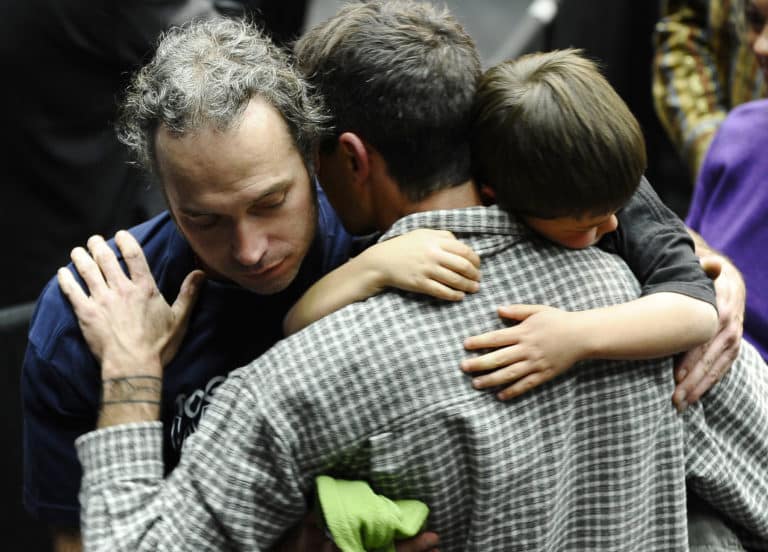
Men mourn at a tribute service for the six people who were killed and the 14 wounded in the assassination attempt on congresswoman Gabrielle Giffords in Arizona in 2011. Image by Jewel Samad/Agence France-Presse / Getty Images ..
Remembering How to Weep
When I was about twelve years old, my father found out that a young woman who worked at his restaurant had died by suicide. I remember watching my papa’s response to the tragic news in the attentive way a son observes his father. I remember seeing his body collapse under the weight of shock and loss, and his hands lifting to cover his face. I remember hearing his quiet sobs, and sensing that I was witnessing something essential about being human.
Seeing my father surrender to his sorrow was one of the most valuable gifts I ever received from him. It showed me that a man can weep, and planted a seed that I would later need in reclaiming my own capacity to grieve.
Grief is one of the most natural and universal experiences we have as human beings. Our hearts ache when we lose what we love. Of course, we’re heartbroken by deaths, changes in relationships, illness, and the myriad transitions of life. Beyond these, we’re all wounded by the widespread destruction of life — near and far — occurring across our Earth.
It’s imperative that we be able to feel and to name our heartache in response to these enormous losses. Giving voice to grief is how we continue to love what we’ve lost, as well how we acknowledge the hole in our hearts that remains in the absence of what we loved.
By the time I reached my twenties, I had learned, like so many men today, how to silence my grief. I was unable to feel or speak of my sorrows. Eventually, this build-up of unattended grief showed itself as a nagging tightness in my throat and chest, and a pervasive low mood that could easily have been misdiagnosed as depression. In not facing my pain, I had also stifled my capacity to enjoy life.
From the muck of this low place, I was fortunate to stumble upon practices and people that helped me befriend my grief. Thawing out my frozen heart required me to drop beneath the speed and noise of daily life, and to learn to pay attention to the inner life I had forgotten.
Yoga and meditation practices were integral to this process. I learned that I could become aware of my body, mind and heart, and that all of what was within — even if painful or frightening — had something valuable to teach me. I was also blessed to find wise and sensitive people who gently reminded me that I could let my vulnerability be witnessed — that my heartache could be held and healed in relationship.

Turning towards my sorrow was daunting and awkward at first. The waters of grief were unfamiliar, and I feared that in entering them I might get lost or drown in my sadness. But I soon discovered that facing my pain was actually less painful than avoiding it.
As I began to feel, speak about, and weep deeply for the losses I had been ignoring, I felt profoundly relieved and rejuvenated. Slowly, the weight of unfelt and unspoken sadness lifted. In its place, the energy and joy I had lost began to return.
Given that loss and grief are such a basic part of being human, it’s astounding how widely unacknowledged and unexpressed they are in the modern world, especially among men. Consider this: when was the last time you saw a man weep freely without apology or shame?
When we men don’t take time to digest our losses, our hearts become clogged with grief. The pain of grief-congested hearts can be seen all around us, presenting as other forms of suffering like depression, addiction, overwork, or chronic loneliness and anxiety.
We men need to remember how to tend our grief well. We need to practice welcoming the heartache within grief as something that can help us grow into stronger, more compassionate human beings. And we need to teach our boys to do this courageous work as well.
I carry the memory of my father weeping with me as a reminder of the kind of man I want to be, and the kind of man I want to help my son become — a man who is strong enough to weep for what I love, and as I weep, to be cleansed and healed by my tears.
